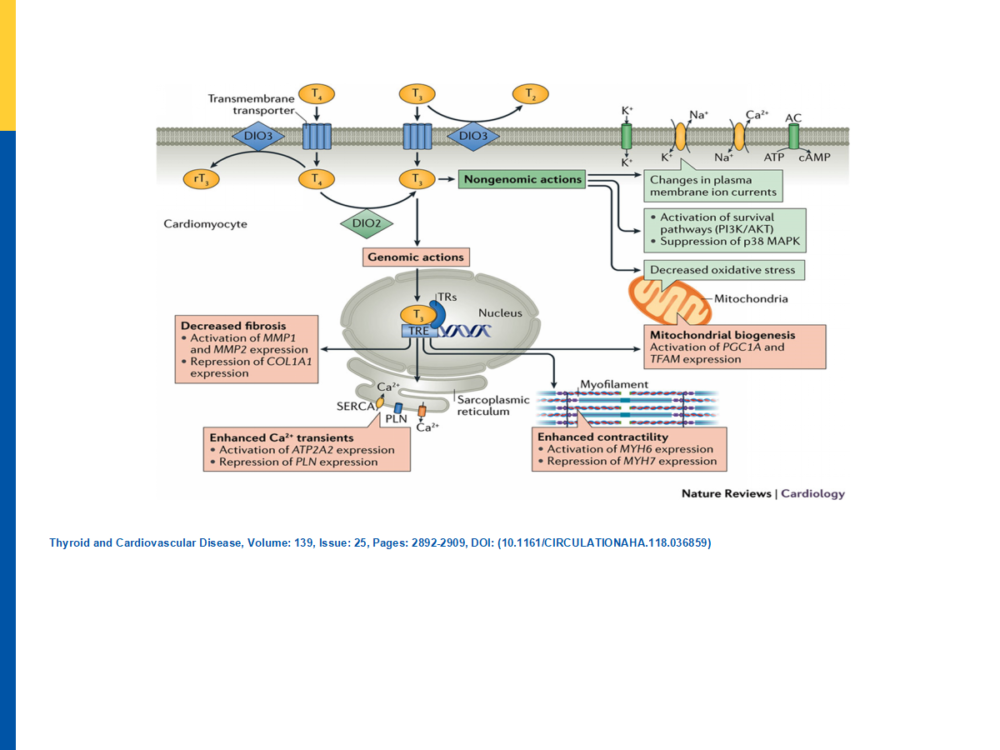Summary:
- The relationship between thyroid hormones and cardiovascular diseases is critical, as thyroid dysfunction can significantly affect heart function.
- Hyperthyroidism increases overall metabolism and myocardial oxygen demand, leading to conditions like tachycardia, atrial fibrillation, and HFrEF.
- Hypothyroidism, on the other hand, primarily causes relaxation disorders in the heart, leading to HFpEF due to impaired sarcoplasmic reticulum function.
- Guidelines recommend checking thyroid function when diagnosing cardiomyopathy, especially in new cases or acute heart failure.
★The relationship between thyroid hormones and cardiovascular diseases is vital, and AHA guidelines recommend checking thyroid hormone levels when diagnosing cardiomyopathies and acute heart failure.
The relationship between thyroid hormones and cardiovascular diseases is extremely important. Guidelines such as those from the AHA recommend checking thyroid hormones when diagnosing cardiomyopathy, including dilated cardiomyopathy, atrial fibrillation, and acute heart failure for the first time. Additionally, although not a disease, amiodarone, which is used for atrial fibrillation and ventricular arrhythmias, also affects the thyroid, making abnormalities or instability of thyroid hormones inevitable during its administration.
★A recent special issue of Circulation highlights the connection between thyroid hormones and heart failure, emphasizing the importance of understanding their impact.
Recently, Circulation published a special issue on the theme of thyroid and heart disease, and I would like to highlight the relationship between thyroid hormones and heart failure. (Anne R. Cappola, et al. Circulation. 2019; 139: 2892–2909. Thyroid and Cardiovascular Disease Research Agenda for Enhancing Knowledge, Prevention, and Treatment). I believe Figure 3 in the paper is particularly easy to understand.

★Thyroid hormones convert to T3 within cardiac cells, influencing chronic heart failure aspects and directly affecting contraction and relaxation mechanisms.
Thyroid hormones, including T4, convert into T3 once inside cardiac cells, where they exert their effects. Clinically, these hormones influence both chronic cardiomyopathy/heart failure aspects, such as oxidative stress and fibrosis, as well as more direct effects on contraction and relaxation mechanisms, including those involving the sarcoplasmic reticulum and myosin. They act as genomic effects by regulating the expression of genes related to protein production. Thyroid hormones work to suppress fibrosis and the production of reactive oxygen species, thereby enhancing myocardial relaxation and contraction.
★Thyroid hormones also impact vascular resistance, sympathetic nervous system, and renin-angiotensin system, with abnormalities contributing to heart failure.
Thyroid hormone abnormalities include hyperthyroidism and hypothyroidism, with the possibility of a critical condition known as a crisis. In the case of hyperthyroidism, increased overall metabolism raises oxygen demand. For the heart, this results in tachycardia and a tendency toward hypercontraction, increasing myocardial oxygen demand and leading to a state of overwork. It is also involved in pulmonary vascular remodeling, related to pulmonary hypertension, and affects ion channels, making atrial fibrillation more likely. Additionally, through the activation of the sympathetic nervous system and the renin-angiotensin system, there is a tendency toward fluid retention, leading to elevated left ventricular end-diastolic pressure. If these conditions persist chronically, they can result in a state of reduced left ventricular contractility, known as HFrEF (Heart Failure with reduced Ejection Fraction). Therefore, it is recommended to check thyroid function when diagnosing dilated cardiomyopathy for the first time.
★Hyperthyroidism increases metabolic demand and can lead to HFrEF, while hypothyroidism causes relaxation disorders, potentially leading to HFpEF, with thyroid hormone supplementation often improving symptoms.
In contrast, hypothyroidism primarily manifests with relaxation disorders, leading to a condition known as HFpEF (Heart Failure with preserved Ejection Fraction). This is believed to be due to a decline in the function of the sarcoplasmic reticulum, which is involved in myocardial relaxation. When thyroid hormone levels decrease, the expression of SERCA2a (sarcoplasmic/endoplasmic reticulum calcium ATPase 2), a channel that takes in calcium from within the cardiac cells to the sarcoplasmic reticulum, decreases, and the expression of phospholamban (PLN), which negatively regulates calcium uptake, increases, leading to relaxation disorders. However, since these are primarily functional disorders, it is often reported that supplementing with thyroid hormones can improve the functional impairments.



